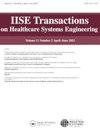Tactical scheduling of surgeries to level bed utilization in the intensive care unit
IF 1.5
Q3 HEALTH CARE SCIENCES & SERVICES
IISE Transactions on Healthcare Systems Engineering
Pub Date : 2020-07-09
DOI:10.1080/24725579.2020.1793845
引用次数: 13
Abstract
Abstract The intensive care unit is a highly specialized and expensive hospital resource serving both emergency and scheduled patients. The vast majority of scheduled patients arrive from the operating theater. Therefore, the operating theater schedule has a strong impact on intensive care unit occupancy levels. Prior research focuses on the creation of a new master surgery schedule to optimize the patient flow in downstream units. In practice, however, the master surgery schedule affects a multitude of related processes, and changing it causes significant disruptions within the hospital. Hence, our approach emphasizes a centralized reallocation of scheduled surgeries while maintaining the existing master surgery schedule. We propose a mixed-integer quadratic model that optimizes the tactical surgery schedule to balance the expected day-to-day occupancy of scheduled patients in the surgical intensive care unit. Supported by two years of data from a German university hospital, we analyze three planning strategies and their impact on bed utilization in the intensive care unit. Our approach yields an improvement of 17.5% in intensive care bed utilization variability compared to a decentral approach, which is similar to current hospital practice. Additionally, we show that our approach can realize the majority of the improvement potential without the disruptions that derive from an entirely new master surgery schedule.战术调度手术,以提高病床利用率在重症监护病房
重症监护室是一种高度专业化和昂贵的医院资源,同时服务于急诊和预约患者。绝大多数预定的病人都是从手术室来的。因此,手术室的时间表对重症监护病房的占用水平有很大的影响。先前的研究侧重于创建一个新的主手术时间表,以优化下游单位的患者流量。然而,在实践中,主手术时间表会影响许多相关过程,改变它会导致医院内部的重大中断。因此,我们的方法强调在维持现有主手术计划的同时,集中重新分配已安排的手术。我们提出了一个混合整数二次模型,该模型优化了战术手术时间表,以平衡外科重症监护病房预定患者的预期每日占用率。在德国一家大学医院两年的数据支持下,我们分析了三种规划策略及其对重症监护病房床位利用的影响。与分散式方法相比,我们的方法在重症监护病床利用率变异性方面提高了17.5%,分散式方法与目前的医院实践类似。此外,我们表明,我们的方法可以实现大部分的改善潜力,而不会受到来自一个全新的主手术计划的干扰。
本文章由计算机程序翻译,如有差异,请以英文原文为准。
求助全文
约1分钟内获得全文
求助全文
来源期刊

IISE Transactions on Healthcare Systems Engineering
Social Sciences-Safety Research
CiteScore
3.10
自引率
0.00%
发文量
19
期刊介绍:
IISE Transactions on Healthcare Systems Engineering aims to foster the healthcare systems community by publishing high quality papers that have a strong methodological focus and direct applicability to healthcare systems. Published quarterly, the journal supports research that explores: · Healthcare Operations Management · Medical Decision Making · Socio-Technical Systems Analysis related to healthcare · Quality Engineering · Healthcare Informatics · Healthcare Policy We are looking forward to accepting submissions that document the development and use of industrial and systems engineering tools and techniques including: · Healthcare operations research · Healthcare statistics · Healthcare information systems · Healthcare work measurement · Human factors/ergonomics applied to healthcare systems Research that explores the integration of these tools and techniques with those from other engineering and medical disciplines are also featured. We encourage the submission of clinical notes, or practice notes, to show the impact of contributions that will be published. We also encourage authors to collect an impact statement from their clinical partners to show the impact of research in the clinical practices.
 求助内容:
求助内容: 应助结果提醒方式:
应助结果提醒方式:


